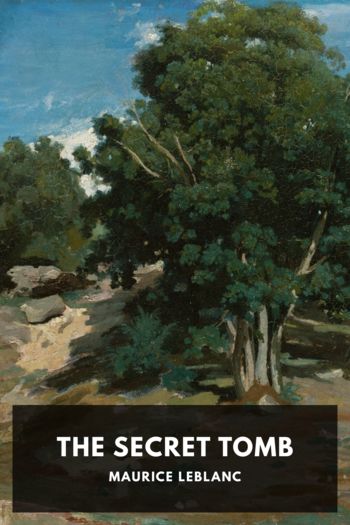The Secret Tomb - Maurice Leblanc (free ebook reader txt) 📗

- Author: Maurice Leblanc
Book online «The Secret Tomb - Maurice Leblanc (free ebook reader txt) 📗». Author Maurice Leblanc
Then they saw him face to face; and since one of the young men raised his lamp that its light might not shine in his eyes, that lamp lit up on the wall of the alcove above the bed the portrait of which the Marquis had made mention. They could then perceive that it was indeed the portrait of the man. The same enormous brow, the same eyes deeply sunk in their orbits, the same high cheekbones, the same bony jaw, the same projecting ears. But the man, contrary to the prediction in the letter, had greatly aged and grown considerably thinner, for the portrait represented a nobleman of good appearance and sufficiently plump.
Twice he tried to stand upright without succeeding. He was too weak; his legs refused to support him. He seemed also to be laboring under a heavy oppression and to breathe with difficulty, either because he had lost the habit or because he needed more air. Dorothy observed two planks nailed to the wall, pointed them out to Dario and Webster, and signed to them to pull them down. It was easy to do so, for they were not nailed very firmly to the wall; and they uncovered a small round window, a bull’s-eye rather, not more than a foot or fifteen inches across.
A whiff of fresh air blew into the room all round the man sitting on the bed; and for all that he appeared to have no understanding of anything, he turned towards the window, and opening his mouth, drew in great breaths.
All these trifling incidents were spread over a considerable time. The astonished witnesses of them had a feeling that they were taking part in the mysterious phases of a resurrection which they were wholly unable to consider final. Every minute gained by this living dead man appeared to them a new miracle which passed all imagining, and they hoped for the inevitable event which would restore things to their natural order, and which would be as it were the disarticulation and crumbling away of this incredible automaton.
Dorothy stamped her foot impatiently, as if she were struggling against herself and trying to shake off a torpor.
She turned away from this sight which fascinated her, and her face took on an expression of such profound thought, that her companions withdrew their eyes from the man to watch her. Her eyes were seeking something. Their blue irises became of a deeper blue. They seemed to see beyond what ordinary eyes see and to pursue the truth into more distant regions.
At the end of a minute or two she said:
“We must try.”
She went firmly to the bed. After all here was a clear and definite phenomenon; it had to be taken into account: this man was alive. It was necessary therefore to treat him as a living being, who has ears to hear and a mouth to speak with, and who distinguishes the things about him by a personal existence. This man had a name. Every circumstance pointed directly to the fact that his presence in this sealed chamber was the result not of a miracle—a hypothesis which they need only examine as a last resort—but of an experiment that had succeeded—a hypothesis which one had no right to set aside for a priori reasons, however astonishing it might appear to be.
Then why not question him?
She sat down beside him, took his hands, which were cold and moist, in hers and said gravely:
“We have hastened hither at your summons. … We are they to whom the gold medal—”
She stopped. The words were not coming easily to her. They seemed to her absurd and childish; and she was quite certain that they must appear so to those who heard them. But she must make an effort to continue:
“In our families the gold medal has passed from hand to hand right down to us. … It is now for two centuries that the tradition has been forming and that your will—”
But she was incapable of continuing on these pompous lines. Another voice within her murmured:
“Goodness, how idiotic what I am saying is!”
However, the hands of the man were growing warm from their contact with hers. He almost wore an air of hearing the noise of her words and of understanding that they were addressed to him. And so, dropping the phrase-making, she brought herself to speak to him simply, as to a poor man whom his resurrection did not set apart from human necessities:
“Are you hungry? … Do you want to eat? … to drink? Answer. What would you like? … My friends and I will try. …”
The old man, with the light full on his face, his mouth open, his lower lip hanging down, preserved a dull and stupid countenance, animated by no expression, no desire.
Without turning away from him, Dorothy called out to the notary:
“Don’t you think we ought to offer him the second envelope, Maître Delarue, the codicil? His understanding may perhaps awake at the sight of this paper which formerly belonged to him, and which, according to the instructions in the will, we’re to hand over to him.”
Maître Delarue agreed with her and passed the envelope to her. She held it out to the old man, saying:
“Here are the directions for finding the diamonds, written by yourself. No one knows these directions. Here they are.”
She stretched out her hand. It was clear that the old man tried to respond with a similar movement. She accentuated the gesture. He lowered his eyes towards the envelope; and





Comments (0)